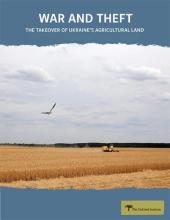Land Library Search
Through our robust search engine, you can search for any item of the over 73,000 highly curated resources in the Land Library.
If you would like to find an overview of what is possible, feel free to peruse the Search Guide.
/ library resources
Showing items 1 through 9 of 37.Green energy (and/or renewable energy) requires large areas of land to operate, often more so than energy generated from fossil fuels. The acquisition of land comes with accompanying corruption risks which can lead to challenges such as land grabbing and illegal displacement of communities.
Despite the existence of a legal framework defining the right to fair compensation, and notwithstanding the vast literature on transnational and domestic land deals, no theory has been developed so far to allow for a specific analysis of the economics of fair compensation in large-scale land acqu
War and Theft: The Takeover of Ukraine’s Agricultural Land, exposes the financial interests and the dynamics at play leading to further concentration of land and finance.
This article is about the strategic use of adat arguments in the politics of large-scale land acquisition.
This article is about the strategic use of adat arguments in the politics of large-scale land acquisition.
The upward land grabbing trend in Eastern Europe has remained understudied, as well as its strong interlinkages with political narratives - more specifically with the ones proposed by Euroskepticism and populism.
Economic globalization promotes the economic development of underdeveloped regions but also influences the ecological environments of these regions, such as natural forest degradation.
This paper explores the political processes that activists engaged in contesting land grabbing have triggered to connect claims across borders and to international institutions, regimes and processes.
Concessions granted to investors in Cambodia have generated a deep sense of insecurity in rural forested areas. Villagers are not confined to a passive “everyday resistance of the poor,” as mentioned by James Scott, insofar as they frequently engage in frontal strategies for recovering land.





